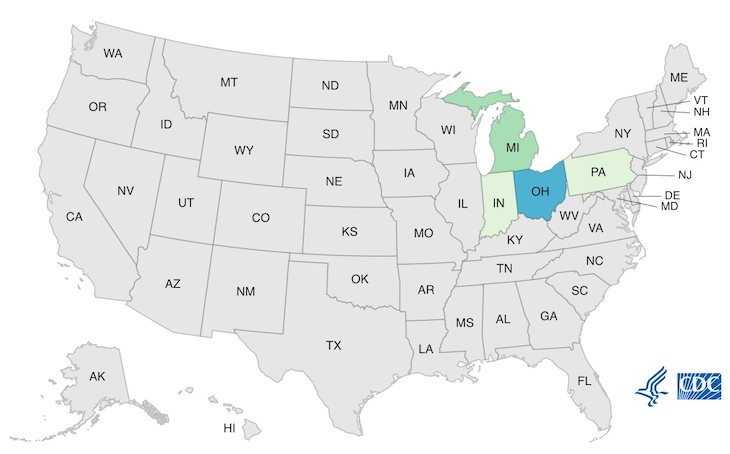Wendy’s romaine lettuce has been named in the growing E. coli outbreak by the Centers for Disease Control and Prevention (CDC). While this has not been confirmed, many sick people reported eating sandwiches made with romaine lettuce at Wendy’s restaurants in Michigan, Ohio, and Pennsylvania before getting sick.

Based on this information, Wendy’s is removing the romaine lettuce used in those sandwiches from restaurants in that region. Wendy’s uses a different type of romaine lettuce in their salads. Investigators are trying to confirm whether romaine lettuce is the source of this outbreak, and whether that lettuce was used in Wendy’s sandwiches sold in other states.
The case count by state is: Indiana (1), Michigan (15), Ohio (19), and Pennsylvania (2). Indiana and Pennsylvania have been added to the case counts since the last update two days ago, and an addition of 12 more patients. The patient age range is from 6 to 91. Of twenty-four people who have been interviewed, 10, or 42%, have been hospitalized. Three people who live in Michigan have developed hemolytic uremic syndrome (HUS), a type of kidney failure.

Food Safety Attorney and Food Poisoning Bulletin Publisher Eric Hageman
Noted food safety lawyer Eric Hageman, who has represented many clients and families in E. coli lawsuits, said, “No one, especially small children, should get sick with an E. coli infection or HUS just because they ate lunch at a fast food restaurant. We hope investigators definitively determine the cause of this outbreak.”
Among 26 people who were interviewed by public health officials, 22, or 86%, said they ate at a Wendy’s restaurant the week before they got sick. They ate a variety of foods, including burgers and sandwiches. Romaine lettuce served on those burgers and sandwiches was one of the most common ingredients among the menu items. Other ingredients are still being analyzed to see if any other foods could be the source of this outbreak.
If you ate at a Wendy’s restaurant, especially any food that included Wendy’s romaine lettuce, and have been ill with the symptoms of an E. coli infection, which include severe and painful abdominal cramps and bloody diarrhea, see your doctor. Anyone who is experiencing deceased urine output, lethargy, and pale skin may have developed HUS and should see a doctor.

If you have been sickened with a Listeria infection, please contact our experienced attorneys for help with a possible lawsuit at 1-888-377-8900 or text us at 612-261-0856. Our firm represents clients in lawsuits against restaurants and food processors.




